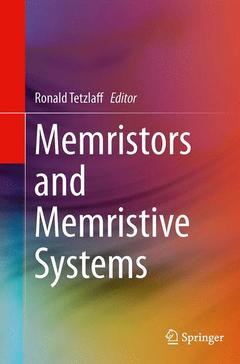Description
Memristors and Memristive Systems, Softcover reprint of the original 1st ed. 2014
Coordinator: Tetzlaff Ronald
Language: English
Subjects for Memristors and Memristive Systems:
Approximative price 105.49 €
Subject to availability at the publisher.
Add to cartSupport: Print on demand
409 p. · 15.5x23.5 cm · Hardback
Description
/li>Contents
/li>Comment
/li>
Provides a single-source reference to the state of the art in memristor research
Explains the theory of memristors and memristive networks
Demonstrates a variety of memristor realizations with focus on resistive random access memories
Enables readers to use neuromorphic modeling to understand complex phenomena in biological systems
These books may interest you

Memristor Networks 158.24 €

Memristor Networks 158.24 €

Memristor Emulator Circuits 105.49 €

